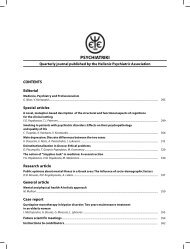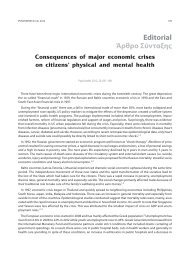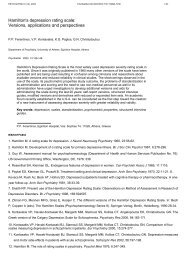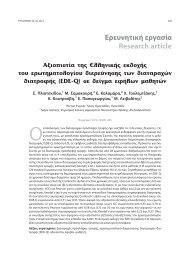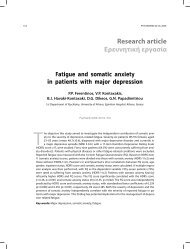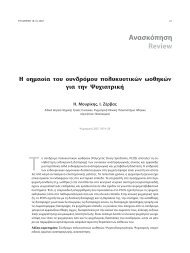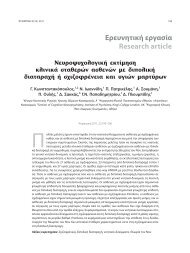Πλήρες Τεύχος - Ελληνική Ψυχιατρική Εταιρεία
Πλήρες Τεύχος - Ελληνική Ψυχιατρική Εταιρεία
Πλήρες Τεύχος - Ελληνική Ψυχιατρική Εταιρεία
Create successful ePaper yourself
Turn your PDF publications into a flip-book with our unique Google optimized e-Paper software.
294 D. LECIC-TOSEVSKI et al PSYCHIATRIKI 22 (4), 2011and associates 33 pointed to the fact that neuroticismwas less frequently connected with focused copingand seeking social support, and more frequently withattempts to use imagination and avoidance. Endlerand Parker 34 reported high correlation between neuroticismand emotion-oriented coping. These resultsare not surprising, considering that negative emotionsare the part of stress, while neuroticism is sometimesdefined as inclination towards negative emotions.35 Any attempt to comprehend the situationaldeterminants of stress and coping has to take intoaccount the neuroticism as well.The role of extraversion is less clear. The unity ofextraversion and coping strategy such as humour, aneed to discuss feelings and seeking social support,has been confirmed. 36 Gallagher 37 stated that personsscoring high on extraversion scale perceivedacademic stressors as challenges, rather than threats.Generally, extraversion is connected with proactive,social and optimistic ways of coping with stress.Co-operativeness is connected with stoic andsubmissive attitude when encountering stressors.Considering that the dimension conscientiousnessinvolves traits such as persistency, self-disciplineand planning, it may be expected that it is associatedwith efficient coping. One of the several studiestackling this issue, has shown strong correlation(r=0.44) between the conscientiousness andproblem solving, as one way to cope with stress. 38In their new study, Spirrison and associates 39 cameup with the new correlation of 0.62 both betweenthe dimension of conscientiousness and NEO-PI-Rinventory and the behavioural coping scale fromthe Constructive Thinking Inventory by Epstein andMeier. 40The dimension openness to experience is the predictorof positive coping, involving connecting,coping with problems – the transcendence, etc. 41Trusting others, as one of the components of agreeablenessdimension, is positively correlated withseeking social support. 42Folkman 43 found that the coping affected healththrough its mediating variables (such as mood).She raised the question whether coping affectedmood or mood affected coping, and named studieswhich suggested that this was a two-directionpossibility. However, the majority of studies on copingdealt with coping→mood, rather than mood→coping relationship. The field that had often beenneglected in studying the relation between copingand health, refers to the ability of proper functioningwhen facing extreme difficulties, in relation towhich Folkman 43 referred to the role of positiveaffect. After having analyzed the results of severalstudies examining the connection between positiveand negative affects and health, Folkman assertedthat positive situations, whether being the outcomeof positive events or positive affects, had three importantfunctions when coping with chronic and severestress. Positive emotions help motivate peopleto initiate coping, to proceed with their lives whenthings become tough and ameliorate distress.The research of Folkman and associates has identifiedfour mechanisms of coping, relying on significance/meaningthat help explain the role of positiveaffect: (a) positive reappraisal, refers to cognitivereframing of what has happened or what couldhave happened; (b) goal-directed problem-focusedcoping, which includes knowing when to abandongoals that are no longer tenable and replace themwith new goals that are both tenable and meaningful;(c) using spiritual or religious beliefs to seekcomfort; and (d) infusion of meaning into the ordinaryevents of daily life in order to gain a psychologicaltime-out from distress. 43In contrast to that, Type A personality (coronarypronepersonality) epitomises the style of copingfocused on negative emotions. 44 Concurrently, TypeA personality is characterized with avoidant copingstyle. 45,46 Also, Scheier and Carver 47 have shown thatoptimists use problem-focused strategies more oftenthan pessimists.ConclusionLecic-Tosevski and associates 17 named some ofthe factors describing a resilient personality. The listrepresents the synthesis of standpoints presentedin the literature, including thoughts of the authors:ability to cope in stressful situations, continuingengagement in activities, flexibility to unexpectedchanges in life, ability to seek social support, perceivingstress as a challenge – a chance for growthand development rather than a threat to life, takingcare of one’s body, living in harmony with nature,optimism and sense of humour, work and love, developingspiritualism and seeking true sense. 17,48–50




